Dear Friends,
Happy New Year and welcome to our January 2020 eletter. We are happy to report that we raised $40,000 toward our 2019 year-end appeal goal of $50,000. Thank you so much for your incredible support! Read on for updates of the latest work that we've undertaken together, for the benefit of all beings everywhere. Please share!
On the LYWA Podcast: The Meaning of Guru Devotion
Devotion is like the mother. From the mother comes many children, then grandchildren, then all the generations. Like that, from devotion all the qualities come, the realizations and all the qualities. From devotion comes the understanding of Dharma words and then the realization of their meaning. From devotion so many qualities come, and also with devotion you are able to protect those qualities.
—Lama Zopa Rinpoche
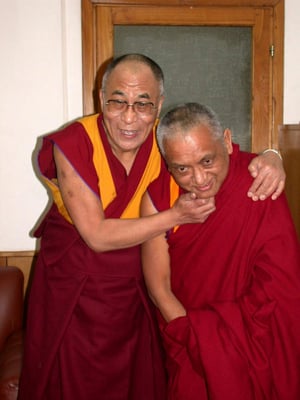 This month’s podcast brings you teachings from a series given by Lama Zopa Rinpoche at Root Institute, Bodhgaya, India, December 26-31, 2006. Rinpoche describes the mystery of the guru deity and discusses the importance of guru devotion in developing all the qualities on the path to the enlightenment. Those who live their lives infused with devotion can progress much more quickly than by intellect alone. Rinpoche then illustrates this phenomena with engaging stories from his youth. You can read along with the transcript here on our website.
This month’s podcast brings you teachings from a series given by Lama Zopa Rinpoche at Root Institute, Bodhgaya, India, December 26-31, 2006. Rinpoche describes the mystery of the guru deity and discusses the importance of guru devotion in developing all the qualities on the path to the enlightenment. Those who live their lives infused with devotion can progress much more quickly than by intellect alone. Rinpoche then illustrates this phenomena with engaging stories from his youth. You can read along with the transcript here on our website.
The LYWA podcast contains hundreds of hours of audio, each with links to the accompanying lightly edited transcripts. See the LYWA podcast page to search or browse the entire collection by topic or date, and for easy instructions on how to subscribe.
From the Video Archive: On Universal Education
Lama Zopa Rinpoche begins a joyful talk about the development of Universal Education as illuminated by the 16 Rules of King Songtsen Gampo. Rinpoche demonstrates the power of motivation in invoking immediate benefit to all beings by whatever is most needed in the world right now. The most important goal for Universal Education is to develop an assortment of methods to help young people develop the good heart in order to have the happiest life possible and thereby become the source of happiness for all beings in this world. The principles of Universal Education as envisioned by Lama Yeshe and Lama Zopa Rinpoche are today being implemented by the Foundation for the Development of Wisdom and Compassion. This talk begins Rinpoche’s commentary on the 16 Rules and was given by Rinpoche at Land of Medicine Buddha on April 7, 2003.
Visit and subscribe to the LYWA YouTube channel to view dozens more videos freely available from our archive. See also the FPMT YouTube channel for many more videos of Lama Zopa Rinpoche’s teachings.
WHAT'S NEW ON OUR WEBSITE
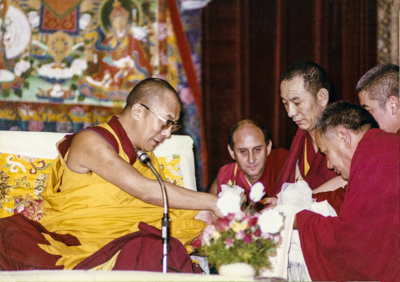 This month we posted Lama Zopa Rinpoche’s introductions to five of the souvenir booklets produced for the Dharma Celebrations held at Tushita Mahayana Meditation Centre in Delhi. Tushita-Delhi’s first Dharma Celebration was held in 1981 and has become a regular event, often hosting His Holiness the Dalai Lama and other great teachers. Read Rinpoche's introduction to one of the souvenir booklets in the eletter teaching below.
This month we posted Lama Zopa Rinpoche’s introductions to five of the souvenir booklets produced for the Dharma Celebrations held at Tushita Mahayana Meditation Centre in Delhi. Tushita-Delhi’s first Dharma Celebration was held in 1981 and has become a regular event, often hosting His Holiness the Dalai Lama and other great teachers. Read Rinpoche's introduction to one of the souvenir booklets in the eletter teaching below.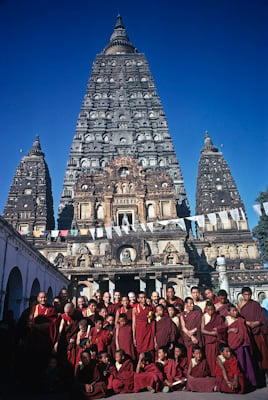
Advice on Pilgrimage
LYWA Reports: His Holiness the Dalai Lama Visits South India
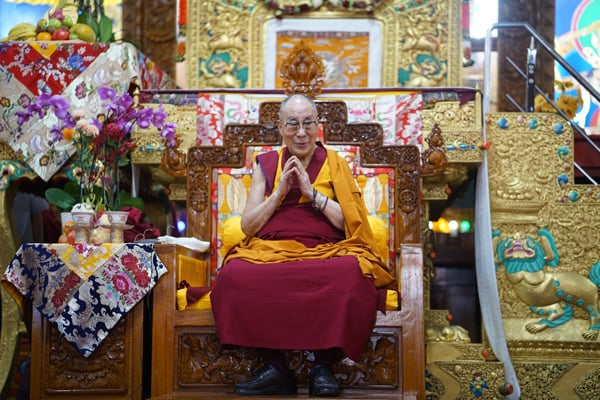 In December 2019, His Holiness the Dalai Lama traveled to Mundgod, a Tibetan settlement in Karnataka, south India, for the 600th anniversary of Lama Tsongkhapa’s parinirvana. The celebrations were hosted by Drepung and Ganden, two large Gelug monasteries that have been re-established in Mundgod and are now home to thousands of Sangha.
In December 2019, His Holiness the Dalai Lama traveled to Mundgod, a Tibetan settlement in Karnataka, south India, for the 600th anniversary of Lama Tsongkhapa’s parinirvana. The celebrations were hosted by Drepung and Ganden, two large Gelug monasteries that have been re-established in Mundgod and are now home to thousands of Sangha.
During his twelve-day visit to Mundgod, His Holiness gave several teachings, conferred a Lama Tsongkhapa long-life empowerment and bodhisattva vows on a gathering of 25,000 people, attended debate sessions and a conference with international guests, and finally accepted a long-life puja offering.
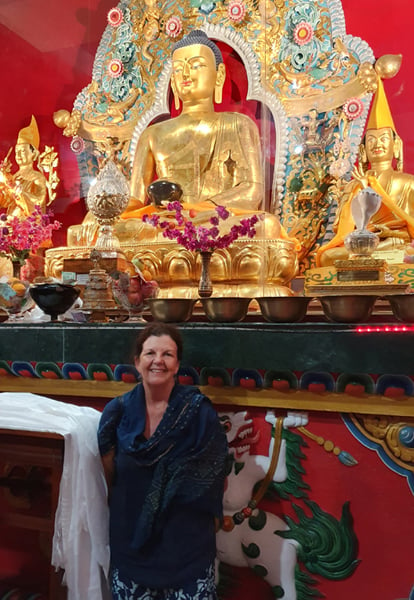 LYWA web editor Sandra Smith had the opportunity to go to the celebrations in Mundgod. She reports: “Amazingly, the causes and conditions ripened for me to go to India for these auspicious events. How fortunate! Each day was magical, like a dream. The precious words and compassionate actions of His Holiness were inspiring and deeply moving, and there was a profound joyfulness and warm-hearted feeling amongst everyone there—Tibetans and foreigners—as we shared the common bond of devotion to His Holiness. Simply being in the presence of His Holiness is a blessing that seems incomparable.
LYWA web editor Sandra Smith had the opportunity to go to the celebrations in Mundgod. She reports: “Amazingly, the causes and conditions ripened for me to go to India for these auspicious events. How fortunate! Each day was magical, like a dream. The precious words and compassionate actions of His Holiness were inspiring and deeply moving, and there was a profound joyfulness and warm-hearted feeling amongst everyone there—Tibetans and foreigners—as we shared the common bond of devotion to His Holiness. Simply being in the presence of His Holiness is a blessing that seems incomparable.
“As well as attending the teachings and other events in Mundgod, I found time to go inward, to sit quietly in the sacred spaces, to circumambulate and make offerings to the holy objects. A highlight of my trip was an audience with Kyabje Lama Zopa Rinpoche, along with Australian friends. It was a very special time.”
Big Love Update
As you read this, Big Love will have just started the six-week printing process. Preorder will open in two weeks, so keep an eye out for a special eletter announcement from us. As noted above, we have created a Big Love resources page, so keep checking that as the publication date approaches. The official launch of the book will be at 2:00 pm on March 24, at the Great Stupa of Universal Compassion during Lama Zopa Rinpoche’s retreat there. Lama Ösel, the author Adele Hulse, and the publisher (me) will be there as well. Next update next month! It’s getting closer!

Nick Ribush
Director
This Month's Teaching: Lama Zopa Rinpoche on Dharma celebrations
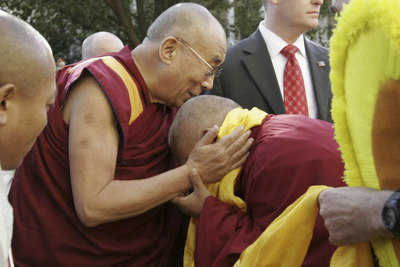 Once again I am very happy to have been asked to write a short introduction to the souvenir booklet produced by Tushita Mahayana Meditation Centre for its eighteenth Dharma Celebration and to welcome everybody here.
Once again I am very happy to have been asked to write a short introduction to the souvenir booklet produced by Tushita Mahayana Meditation Centre for its eighteenth Dharma Celebration and to welcome everybody here.
Tushita was founded by my great teacher, Lama Thubten Yeshe, in 1977, and His Holiness the Dalai Lama has been the guest of honor at Tushita’s almost-annual celebration since the second, which was held in 1982. Needless to say, we are delighted to host His Holiness again, in this, his seventieth year.
His Holiness the Dalai Lama is the Buddha of Compassion and in this time of dreadful natural disasters and increasing man-made turmoil his presence among us is not only somewhat miraculous but also extremely beneficial and necessary. His Holiness is the great treasure of infinite compassion embracing all sentient beings, the sole source of benefit and happiness, and the sole refuge. His Holiness is incomparably kinder to us the fortunate disciples in many countries of this world who are able to see his holy body and hear his holy speech, than all the past, present and future buddhas.
And the compassion His Holiness embodies is no less important. In this time of strife, practically the only thing that will be able to save the world is compassion—the wish for others to be free of suffering.
What is it that makes our life easy and free of confusion and problems? What is the source of all happiness and peace? What brings happiness and peace into our daily life and all happiness up to enlightenment, allowing us to bring happiness and peace to numberless sentient beings? It’s our attitude—the unmistaken attitude with which we live our life, the attitude by which we live our life according to its meaning, fulfilling our purpose of having been born human.
What is that best attitude that gives the most meaning to our life? It is living with compassion, for the benefit of others.
When our attitude is that of simply seeking our own happiness, the attitude itself attracts many difficulties and creates obstacles to our own success. Even if we are trying to serve others, when our basic motivation is that of seeking our own happiness, we experience many ego clashes and personality problems in trying to work with other people. Whether we are working in a meditation centre or an office, if we are self-centered, we will bring all kinds of useless garbage into our life, especially when associating or dealing with others. All kinds of emotional problems will arise.
So even though the work we are doing—working for the welfare of others—is good, our self-centered mind generates all sorts of harmful, unnecessary emotional thoughts—thoughts that are totally useless as far as our job is concerned; thoughts that make others unhappy and angry and disturb their minds. Thoughts such as anger and jealousy create much disharmony between us and others. These harmful emotions impede the success of our work, bring no peace, happiness or harmony, interfere with our work and our health, and can even create obstacles to our life, to our very survival. By leading us to suicide, such thoughts can even cause our death—we’re not killed by someone else; we’re killed by our own emotional mind.
The moment we begin to cherish ourselves is the moment we have created an obstacle to success in working for others. Self-cherishing brings constant problems. Broadly speaking, if we have self-cherishing, we cannot develop bodhicitta. As long as we do not renounce self-cherishing, we cannot develop the holy mind of cherishing others. That means we cannot attain enlightenment, cannot work perfectly for the sake of all the numberless sentient beings.
Thus we can see how the self-centered mind is the main obstacle that prevents us from benefiting others. It is from the self-centered mind that desire, anger and all other negative, emotional thoughts arise, obscuring our mind, blocking our wisdom. Even though there may exist many methods for solving a particular problem and we have the potential to apply them, our self-cherishing attitude totally obstructs our wisdom and prevents us from either seeing or applying them. These emotional thoughts obscure our mind and cause it to hallucinate. Therefore, we cannot perceive the methods that would bring happiness, peace and harmony. Even though, simply by changing our attitude—something that our mind is quite capable of doing—we could apply those methods and solve our problems very easily, somehow we never see it or are unable to do it.
Also, when we are not clear about the purpose of life, we are never clear when it comes to making decisions that affect our life. We always hesitate and are always in danger of making the wrong decision. When our only purpose for living is the benefit of others, it is very easy to make the right decision. It is easy because we are very clear about why we are alive.
If there is compassion in our heart, we do not harm others. All other sentient beings receive no harm from us, the one individual. Instead of receiving harm from us, they receive peace and happiness. Not only do we not harm them but, out of compassion and according to our ability, we benefit them as much as we can. On the basis of not harming, we benefit. Therefore, numberless sentient beings receive much peace and happiness from our compassion.
So, whether or not numberless sentient beings receive that great peace and happiness is entirely up to us. Giving great peace and happiness to others is completely up to us because it depends upon what we do with our mind, whether or not we practice compassion toward others. Our own mind makes the decision—either we keep going from life to life harming sentient beings directly or indirectly, or we change our attitude from ego to compassion and offer sentient beings all peace and happiness up to enlightenment. All this depends completely on what we do with our own mind.
Therefore, each of us is responsible for the peace and happiness of all sentient beings, of each sentient being—all happiness up to that of enlightenment.
The purpose of our lives is, on the basis of abstaining from harm, to bring happiness to others, to be useful for others, to free them from all suffering and bring them all happiness. One kind of happiness is the happiness of this life, but long-term happiness—happiness in all future lives—is much more important than that. And, while causing others to experience happiness in all future lives is highly meaningful, it is even more important to lead them to the everlasting happiness of total liberation—cessation of the entire round of suffering and its causes, delusion and karma. This is more important than simply the long-term happiness of future lives because the happiness of future lives is still contaminated happiness while the happiness of liberation never diminishes or degenerates. It is the complete cessation of suffering and its causes. Once the seed, or imprint, of delusion has been eradicated, there is no cause for delusion, and therefore suffering, to ever arise again.
However, as important as leading all sentient beings to everlasting happiness might be, the most important thing we can do is to bring them all into the peerless happiness of full enlightenment—the cessation of even the subtle defilements of mind and the completion of all realizations. However, saying that bringing others to enlightenment is the most important thing does not mean that we should not try to give others the happiness of this life. It means that starting from the intention of enlightening all sentient beings, according to our own ability, we should offer whatever service we possibly can to all other sentient beings. In other words, on the basis of bringing the happiness of this life to others, we lead them to the ultimate happiness of full enlightenment. Or, on the basis of offering others the greatest benefit possible, that of bringing them to enlightenment, we also offer whatever we can of those previous services.
His Holiness the Dalai Lama’s presence and example serve as an inspiration for us, too, to develop compassion and bodhicitta as he did and to become just like His Holiness—a beacon of hope and wisdom for all sentient beings.
Thank you very much.
This collection presents Lama Zopa Rinpoche’s introductions to five of the souvenir booklets produced for Dharma Celebrations held at Tushita Mahayana Meditation Centre, Delhi, India. Edited by Nicholas Ribush.































